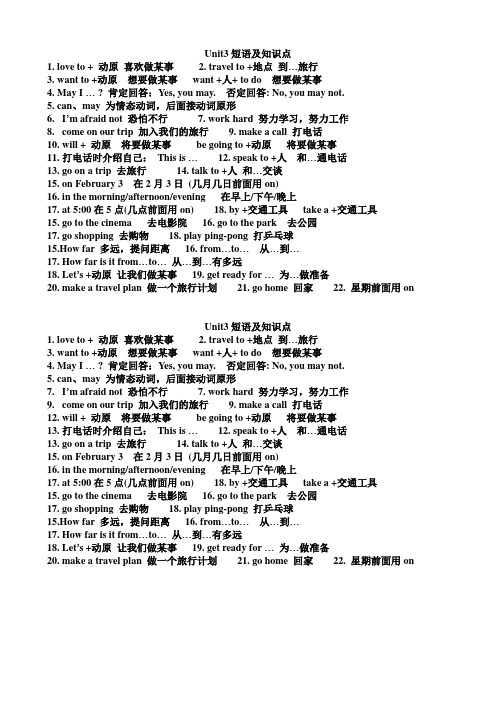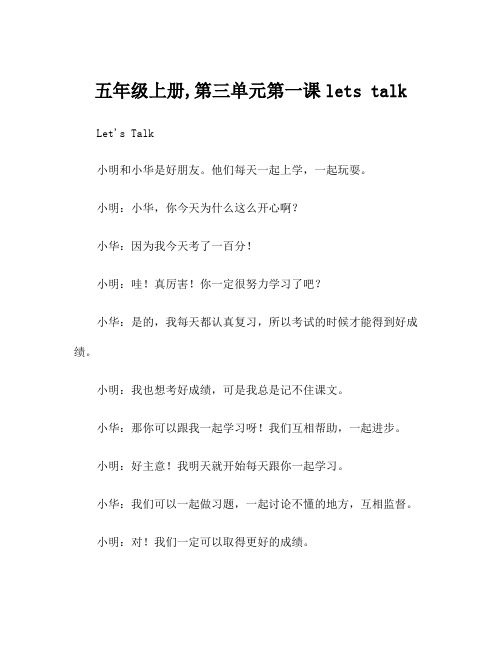五年级上册Unit3口语20121110
- 格式:dps
- 大小:40.00 KB
- 文档页数:1

五年级上册英语第三单元对话以下是一段外研版五年级上册英语第三单元的对话,供参考:Mum: What's this, Li Li?Li Li: It's a map.Mum: Where are we now?Li Li: We are here, Mum.Mum: And where is the post office?Li Li: It's next to the bookstore.Mum: OK. Let's go there.Li Li: Wait, Mum. Let me look at the map first. We can walk there. It's not far.Mum: Good idea. Let's walk there.对话一:Amy: Excuse me, can you show me the way to the museum, please?Tom: Yes, of course. Go to the corner and turn left. Walk one block and turn right. The museum is on the corner.Amy: Thank you very much.Tom: You're welcome.对话二:Mike: Where is the cinema, please?Lucy: It's next to the hospital.Mike: Is it far from here?Lucy: No, it isn't. You can walk there.Mike: Thank you very much.Lucy: You're welcome.对话三:Daming: Excuse me, how can I get to the park?Sam: Oh, it's very far from here. You can take a bus or a taxi.Daming: Where is the bus stop?Sam: Go straight and turn left at the traffic lights. The bus stop is on the right.Daming: Thank you very much.Sam: You're welcome.请注意,这些对话仅供参考,具体内容可能会因为版本或课程的不同而有所差异。

英语五年级上册Unit3课文知识点当阅读量达到一定程度时,才真正找到学英语的感觉。
下面是小偏整理的英语五年级上册Unit3课文知识点,感谢您的每一次阅读。
英语五年级上册Unit3课文知识点Unit3Whatwouldyoulike?你想要什么?What'syourfavouritefood?你最喜欢吃什么?Salad.色拉。
Thesandwichisdelicious.三明治很美味。
Verysweet.Yum!很甜。
美味!Don'teattoomuch!别吃太多!Whatwouldyouliketoeat?你想吃什么?Salad.It'shealthy.色拉。
很健康。
I'dlikesomenoodles.我想要一些面条。
It'smybirthdaytoday.今天是我的生日。
Happybirthday!生日快乐!Thankyou.谢谢。
Unit3ALet'stry一起试试Sarahishungry.萨拉饿了。
Whatwouldsheliketoeat?她想吃什么?Listenandfillintheblanks.听并填空。
Mum,I'mhungry.妈妈,我饿了。
Whatwouldyouliketoeat?你想吃什么?I'dlikesomebreadandchicken,please.我想吃面包和鸡肉。
Hereyouare,dear.Havesomechickensandwiches.给你,亲爱的。
吃点鸡肉三明治。
Thanks,Mum.谢谢,妈妈。
Unit3ALet'stalk一起说吧Father:I'mhungry.我饿了。
Mother:Whatwouldyouliketoeat?你想吃什么?Father:Asandwich,please.请给我一个三明治。
Mother:OK.好。
Sarah:Whatwouldyouliketodrink?你想喝什么? Father:I'dlikesomewater.I'mthirsty!我想要一些水。

Unit3短语及知识点1. love to + 动原喜欢做某事2. travel to +地点到…旅行3. want to +动原想要做某事want +人+ to do 想要做某事4. May I … ? 肯定回答:Yes, you may. 否定回答: No, you may not.5. can、may 为情态动词,后面接动词原形6.I’m afraid not 恐怕不行7. work hard 努力学习,努力工作e on our trip 加入我们的旅行9. make a call 打电话10.will + 动原将要做某事be going to +动原将要做某事11.打电话时介绍自己:This is …12. speak to +人和…通电话13. go on a trip 去旅行14. talk to +人和…交谈15. on February 3 在2月3日(几月几日前面用on)16. in the morning/afternoon/evening 在早上/下午/晚上17. at 5:00在5点(几点前面用on) 18. by +交通工具take a +交通工具15. go to the cinema 去电影院16. go to the park 去公园17. go shopping 去购物18. play ping-pong 打乒乓球15.How far 多远,提问距离16. from…to…从…到…17. How far is it from…to…从…到…有多远18. Let’s +动原让我们做某事19. get ready for …为…做准备20. make a travel plan 做一个旅行计划21. go home 回家22. 星期前面用onUnit3短语及知识点1. love to + 动原喜欢做某事2. travel to +地点到…旅行3. want to +动原想要做某事want +人+ to do 想要做某事4. May I … ? 肯定回答:Yes, you may. 否定回答: No, you may not.5. can、may 为情态动词,后面接动词原形7.I’m afraid not 恐怕不行7. work hard 努力学习,努力工作e on our trip 加入我们的旅行9. make a call 打电话12.will + 动原将要做某事be going to +动原将要做某事13.打电话时介绍自己:This is …12. speak to +人和…通电话13. go on a trip 去旅行14. talk to +人和…交谈15. on February 3 在2月3日(几月几日前面用on)16. in the morning/afternoon/evening 在早上/下午/晚上17. at 5:00在5点(几点前面用on) 18. by +交通工具take a +交通工具15. go to the cinema 去电影院16. go to the park 去公园17. go shopping 去购物18. play ping-pong 打乒乓球15.How far 多远,提问距离16. from…to…从…到…17. How far is it from…to…从…到…有多远18. Let’s +动原让我们做某事19. get ready for …为…做准备20. make a travel plan 做一个旅行计划21. go home 回家22. 星期前面用on。

PEP小学英语五年级上册《Unit 3 A Let’s talk》精品教案教学内容:A Let’s try Let’s talk Talk and match教学目标:一.知识目标:能听懂、会说句子“What do you have forbreakfast/lunch/dinner today?和句子I have …并能在实际情景中进行运用。
二.能力目标:1.能听懂提示语,按照Let’s try 的录音内容判断两张配图的正误。
2.能够用英语“点菜”。
3.能够相互调查一日三餐的用餐情况4.能用英语设计出适合小学生一日三餐的营养食谱。
三.情感、策略、文化目标:1.用任务型语言教学途径,让学生在“做”中学,激发学生学习英语的兴趣。
培养学生学习英语的积极态度,使学生乐于合作参与,勇于进行交际实践。
2.了解中西方饮食方面的不同之处。
语言任务:在本次教学活动过程中,教师是组织者,起引导作用;学生是“主角”,是活动的主体,他们以小组为单位,进行口语、笔头练习。
教师和学生之间既是师生关系,同时也互相合作、交流,因此又是合作伙伴关系。
这次活动采用情景法、交际法及“任务型”教学途径。
在教学过程中,关注学生的情感,尊重每个学生,保护他们的自尊心和积极性,营造宽松、民主的教学氛围,建立融洽、和谐的师生交流渠道,依据本单元的教学目标,并结合教学内容设计贴近学生实际的教学活动,鼓励他们在学习中尝试,吸引和组织他们积极参与,从而培养学生的合作精神和语言运用能力。
四.教学重点:能熟练使用句子“What do you have forbreakfast/lunch/dinner today?和句子I have …进行问答练习。
五.教学难点:句子“What would you like for lunch?”与“What do you have for lunch today?”的不同用法,以及对话的理解与拓展。
六.课前准备:1.教师准备录音机和有关录音带。

五年级上册,第三单元第一课lets talk Let's Talk
小明和小华是好朋友。
他们每天一起上学,一起玩耍。
小明:小华,你今天为什么这么开心啊?
小华:因为我今天考了一百分!
小明:哇!真厉害!你一定很努力学习了吧?
小华:是的,我每天都认真复习,所以考试的时候才能得到好成绩。
小明:我也想考好成绩,可是我总是记不住课文。
小华:那你可以跟我一起学习呀!我们互相帮助,一起进步。
小明:好主意!我明天就开始每天跟你一起学习。
小华:我们可以一起做习题,一起讨论不懂的地方,互相监督。
小明:对!我们一定可以取得更好的成绩。
这是小明和小华之间的对话。
他们互相帮助,一起学习,一起进步。
这就是朋友之间应该做的。
我们在学习的过程中,有时候会遇到一些困难。
但只要我们努力学习,坚持不懈,一定可以克服困难,取得好成绩。
学习是一件很有趣的事情,它能带给我们知识,能让我们变得更聪明。
我们要认真学习,不断进步,才能成为一个优秀的学生。
同学们,让我们一起努力学习,互相帮助,一起进步!
以上就是五年级上册第三单元第一课的Let's Talk的内容,希望对你有所帮助。

人教PEP版五年级英语上册第三单元复习内容Unit3 What would you like ?知识点归纳本单元必须要掌握的单词favourite 最喜欢的food 食物eat 吃drink 喝some 一些please 请cow 奶牛flower花wow 哇tomorrow明天now 现在menu 菜单today 今天down 向下slow 慢的snow 雪yellow 黄色window 窗户hungry 饿thirsty 口渴fresh 新鲜的healthy 健康的delicious 美味的hot 辣的sweet 甜的bread 面包noodle面条chicken 鸡肉rice 米饭vegetables 蔬菜beef 牛肉ice cream 冰淇淋hamburger 汉堡包salad 沙拉sandwich 三明治hot dog 热狗fish 鱼tomato 西红柿soup 汤onion 洋葱carrot 胡萝卜pear 梨potato 土豆本单元必须要掌握的句子What would you like to eat? 你想要吃点什么?I’d like a sandwich, a hot dog ,a hamburger...我想要一个三明治,一根热狗,一个汉堡包。
What would you like to drink? 你想要喝点什么?I’d like some tea. 我想要一些茶。
What’s your favourite food? 你最喜欢的食物是什么?Ice cream .It’s sweet. 冰淇淋。
它是甜的。
What about you ? 那你呢?Here you are ! 给你!Sarah’s favourite food is fish.Her favourite drink is milk.Sarah最喜欢的食物是鱼,她最喜欢的饮料是牛奶。
本单元必须要背诵出来的对话(一)A: I’m hungry. A:我饿了。
五年级上册英语第三单元堂词Unit 3 Vocabulary - English for Grade 5, First SemesterIntroduction:In the third unit of the Grade 5 English textbook, students will be introduced to new vocabulary words. These words will expand their English language skills and help them communicate effectively. This article aims to provide a comprehensive overview of the vocabulary words covered in the third unit of the Grade 5 English textbook.1. Greetings and Expressions:In this section, students will learn various greetings and expressions used in daily conversations. These include phrases such as "Good morning," "How are you?" and "Nice to meet you." By mastering these greetings and expressions, students will be able to initiate conversations and interact with others confidently.2. Numbers and Counting:The second section focuses on numbers and counting. Students will learn to count from one to a hundred, as well as understand the concept of ordinal numbers. This knowledge will enable them to quantify objects, express age, and understand numerical information.3. Colors and Shapes:The third section introduces students to different colors and shapes. They will learn the names of primary and secondary colors, as well as common shapes such as circles, squares, and triangles. Recognizing colors and shapeswill enhance their descriptive skills and enable them to describe the world around them accurately.4. Family Members:The fourth section explores the vocabulary related to family members. Students will learn the names of various family members, such as parents, siblings, grandparents, and cousins. Understanding these relationships will allow them to talk about their families and develop stronger bonds with their loved ones.5. Animals and their Habitats:In this section, students will be introduced to different animals and their habitats. They will learn the names of animals like lions, elephants, birds, and fish, as well as where these animals live, such as the jungle, ocean, or farm. This vocabulary will enable students to discuss and understand the diversity of animal life.6. Food and Drinks:The sixth section focuses on vocabulary related to food and drinks. Students will learn the names of common foods and beverages, such as fruits, vegetables, snacks, and drinks. Understanding these words will enable them to express their food preferences, discuss meals, and engage in conversations related to nutrition and health.7. Weather and Seasons:In this section, students will learn about different weather conditions and the names of the four seasons. They will be introduced to words such assunny, rainy, snowy, and windy, as well as the seasons of spring, summer, autumn, and winter. This vocabulary will allow students to describe the weather and discuss seasonal activities.8. School Subjects and Stationery:The final section covers vocabulary related to school subjects and stationery. Students will learn the names of subjects such as math, science, and English, as well as the tools and materials needed for studying, such as pencils, erasers, and notebooks. This vocabulary will aid students in discussing their school activities and organizing their study materials efficiently.Conclusion:The third unit of the Grade 5 English textbook introduces students to a diverse range of vocabulary words. Mastering these words will enhance their communication skills and enrich their understanding of the English language. By learning greetings, numbers, colors, family members, animals, food, weather, and school subjects, students will be well-equipped to express themselves confidently and engage in meaningful conversations.。
PEP小学英语五年级上册1-3单元口语对话文稿五年级上册Unit 1—Unit3口语对话复习下午放学回到家,你采访了妈妈喜欢的食物等。
晚上给爷爷/奶奶看回家作业,讨论起今天上的课及某位老师。
询问爷爷周末通常做什么。
角色:你,爸爸,妈妈,爷爷/奶奶/…A: Mom, what’s your favourite food?Mom: _____. I love____. It’s/ They’re___.Mom: What’s your favourite food?A: _____. I love____. It’s/They’re____.A: Mom. I’m hungry.Mom: What would you like to eat?A: I’d like some____.Mom: What would you like to eat?Dad: I’d like some____.Dad: I’m thirsty.A: Dad, what would you like to drink?Dad: I’d like some ____, please.A: Ok, here you are.Dad: Thanks.A:Grandpa. This is my homework.Grandpa: Great. What do you have on___s?A: I have___,____and___.Grandpa: I love____. Who’s your ___teacher?A:_____.Grandpa: What’s he/she like?A: He/she is____.Grandpa: Is he/she____?A: Yes, he/she is. / No, he/she isn’t.Grandpa, what do you often do on the weekend? Grandpa: I often____and____. How about you? A: I often_____. Sometimes I ____.Grandpa: Do you often____?A: Yes, I do./No, I don’t.。
小学-英语-上册-打印版
小学-英语-上册-打印版 1 【新思路】Unit 3词海拾贝
词海拾贝
1. like
(1)作动词,译为“喜欢”
I like apples. 我喜欢吃苹果。
We like our teachers. 我们喜欢我们的老师。
I like walking/to walk along the lake after dinner. 我喜欢晚餐后沿湖边散步。
(2)would like ,译为“想”
I'd like some apples and bananas. 我想吃些苹果和香蕉。
I'd like to go with him. 我想和他一起去。
(3)feel like doing sth.想做某事
I feel like going to the concert this evening.我想今晚去听音乐会。
2. favourite
(1)作形容词,译为“最喜爱的,特别喜爱的”
Green is my favourite colour.绿色是我最喜欢的颜色。
(2)作名词,译为“最喜欢的人或物”
This book is a favourite with students.这本书是学生最爱读的。